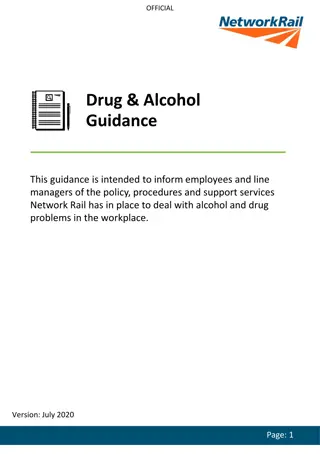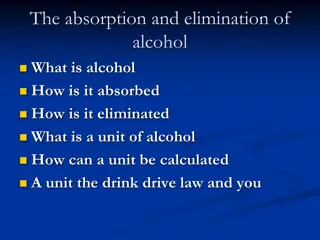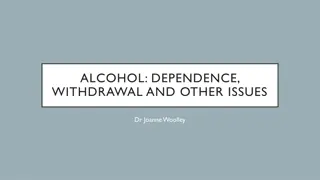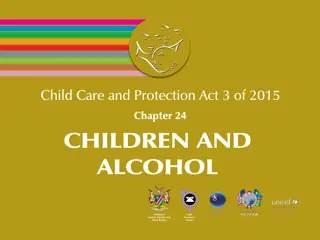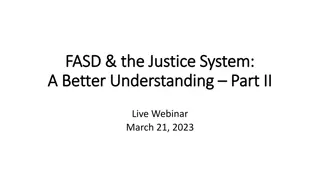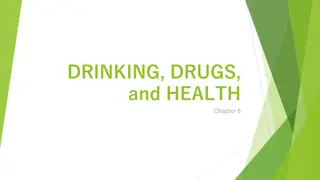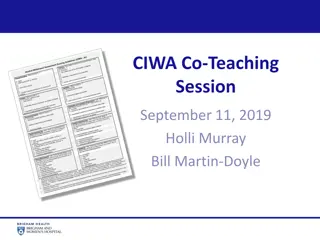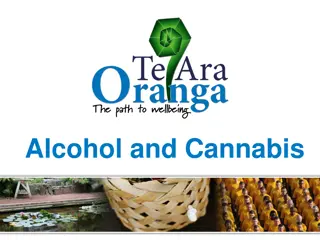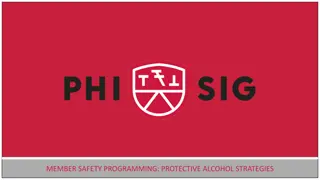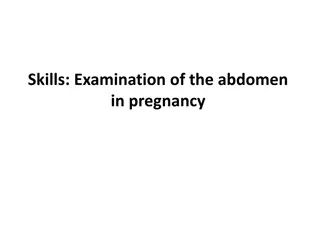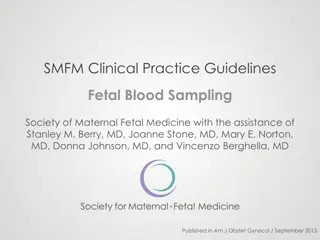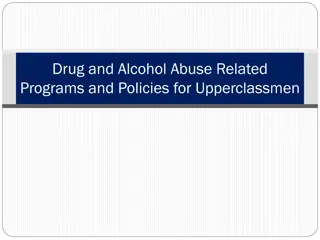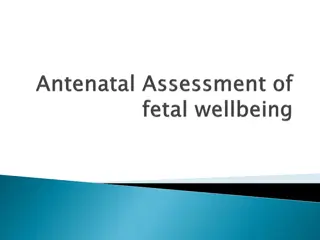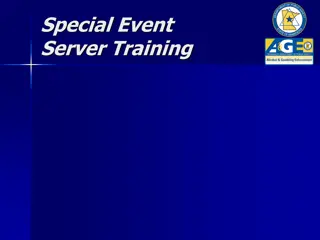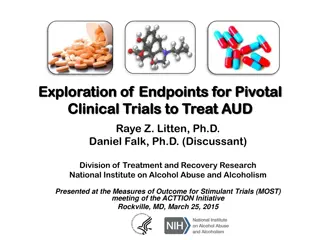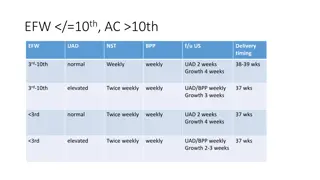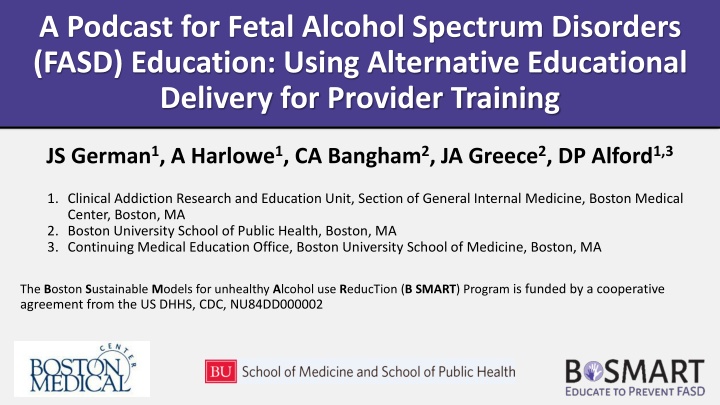
Using Alternative Educational Delivery for FASD Training
The podcast discusses Fetal Alcohol Spectrum Disorders (FASD) education and the impact of prenatal alcohol exposure. It highlights the lifelong effects of FASDs on behavior, learning, and physical health. The program aims to raise awareness, provide training for healthcare providers, and prevent FASDs through innovative educational methods.
Download Presentation

Please find below an Image/Link to download the presentation.
The content on the website is provided AS IS for your information and personal use only. It may not be sold, licensed, or shared on other websites without obtaining consent from the author. If you encounter any issues during the download, it is possible that the publisher has removed the file from their server.
You are allowed to download the files provided on this website for personal or commercial use, subject to the condition that they are used lawfully. All files are the property of their respective owners.
The content on the website is provided AS IS for your information and personal use only. It may not be sold, licensed, or shared on other websites without obtaining consent from the author.
E N D
Presentation Transcript
A Podcast for Fetal Alcohol Spectrum Disorders (FASD) Education: Using Alternative Educational Delivery for Provider Training JS German1, A Harlowe1, CA Bangham2, JA Greece2, DP Alford1,3 1. Clinical Addiction Research and Education Unit, Section of General Internal Medicine, Boston Medical Center, Boston, MA 2. Boston University School of Public Health, Boston, MA 3. Continuing Medical Education Office, Boston University School of Medicine, Boston, MA The Boston Sustainable Models for unhealthy Alcohol use ReducTion (B SMART) Program is funded by a cooperative agreement from the US DHHS, CDC, NU84DD000002
Background FASDs are a range of conditions attributable to prenatal alcohol exposure (PAE)that have lifelong effects, that include behavior, learning and physical problems1 Alcohol is a teratogen whichadversely affects normal brain development throughout all gestational stages FASDs are permanent1 and the most common preventable developmental disabilities in the US In the US, an estimated 1-5% of 1st grade children may have FASDs2 There is no known safe amount, no safe time, and no safe type of alcohol use during pregnancy. 1. SAMHSA. Treatment Improvement Protocol (TIP) 58. (2014). HHS Publication. 2. May PA et al. JAMA. 2018
Background (cont.) Alcohol use during pregnancy 30% reported drinking during their pregnancy1 9.8% reported past 30-day drinking2 4.5% reported past 30-day binge drinking2 Lack of FASD education in health professional training Misinformation from media, community, and medical providers3 more than the occasional drink is likely perfectly fine... Emily Oster in Expecting Better 1. 2. 3. Ethan MK et al. Matern Child Health J. 2009 Lucinda J, et al. MMWR. 2020 Elek E, et al. American Journal of Health Education. 2012
Methods: B SMART Program Boston Sustainable Models for unhealthy Alcohol use ReducTion Aims to prevent FASDs by providing in-person and virtual training and technical assistance Developed a podcast, as they are becoming more prevalent in health professional continuing education1 Hired producer, wrote scripts, recruited experts, individuals with lived experience, and standardized patients Disseminated by multi-faceted promotional campaign including hospital and university social media, listserv outreach, partner-agency collaborations and meetings/trainings Free continuing education credit through Boston University CME/CNE office 1. Berk J. Gen Intern Med. 2020
Methods: Podcast Alcohol and Pregnancy: The More You Know : three 20-minutes episodes Episode 1: Medical expert discusses foundational science of FASDs and a conversation with a mother whose child is affected by prenatal alcohol exposure Alcohol and Pregnancy: The More You Know Episode 2: Patient advocate explores the implications of FASDs and their impacts on children and families. Continues conversation with the mother who discusses the shame and stigma of having a child with an FASD Episode 3: Public health social worker discusses unhealthy alcohol use, as well as the SBIRT model. Hear two standardized patient counseling sessions followed by a debrief and commentary
Methods: Evaluation Plan Evaluation Dimension Data Collection Methods Outcomes Assessed Podcast downloads (Megaphone) Download Number Timing Location Reach CME post-survey Demographics CME post-survey Qualitative and Quantitative Self-reported: Knowledge Perceived skill Intent to change practice Effectiveness
Results: Reach 6 months (3/2021-8/2021) Total downloads n=916 Episode 1: n=397 Episode 2: n=260 Episode 3: n=259 41 U.S. states 18 countries CME claimants n=84 34% Nurse 26% Physician 23% NP 6% PA 4% Behavioral Health 7% Other Webinar Launch B SMART Trainings B SMART Trainings B SMART Training Social Media Social media Partner Listserv emails Partner Listserv email
Results: Effectiveness n=84 Knowledge: 10 questions Content Area % Correct 1. Universal alcohol screening 97% 2. Definition of risky alcohol use (quantity, frequency) 76% 3. Characteristics of alcohol use disorder 85% 4. Facts about prenatal alcohol exposure 92% 5. Facts about prenatal alcohol exposure 92% 6. Facts about FASD 7. FASD clinical features 68% 100% 8. Case:How to start the conversation about alcohol and pregnancy 91% 9. Case: How to counsel about prenatal alcohol exposure 10. Case:How to assess for readiness to change using a readiness ruler 100% 49% 8
Results: Effectiveness n=84 Perceived skill As a result of this activity, do you feel you are better able to 100 93 92 89 90 Yes 80 70 Partially 60 50 40 30 20 11 8 7 10 0 Commmunicate about the risks of PAE Counsel your patients about unhealthy alcohol use Educate about FASDs
Results: Effectiveness n=84 Intent to change practice1 64.5% (54/84) plan to make changes in their practice based on what they learned Most common changes: 26% Incorporate motivational interviewing skills 19% Screen for alcohol use/prenatal alcohol exposure 11% Educate patients about prenatal alcohol exposure and/or FASDs 1. Lockyer JM, et al. Journal of Continuing Education in the Health Professions. 2001
Conclusions Reach of podcast in 6 months was widespread and multidisciplinary, however there was a decrease in downloads for episodes 2 and 3 Substantial number claimed CME/CNE credits and completed post-survey Scored high levels of knowledge for most content areas Reported high level of ability in communicating, counseling, and educating patients as a result of the podcast 2/3 reported intention to change their practice based on what they learned
Limitations Creating and disseminating a podcast is time-intensive Evaluation of podcasts is limited Data is limited by Megaphone collection variables (date, episode, geographic location) Data from CME participants is limited by post-survey design and self- reported data
Implications Podcasts provide an innovative means of education given the broad reach and ease of access, especially as healthcare providers rely more on virtual education Questions remain does convenience of these modalities [podcasts] facilitate learning while multitasking or take away from focused study? 1 1. Berk J. Gen Intern Med. 2020
Questions jacqueline.german@bmc.org



